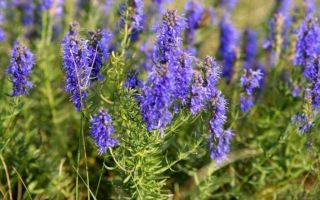Content
Hyssopus officinalis (Hyssopus officinalis) is a semi-shrub herb from the Lamiaceae family. People call it blue St. John's wort, bee grass. The medicinal properties and contraindications of the herb hyssop have been known since ancient times. The first mentions of this plant were found in the treatises of Hippocrates, Dioscorides. Bactericidal and spicy properties were widely used in Ancient Egypt and Rome.
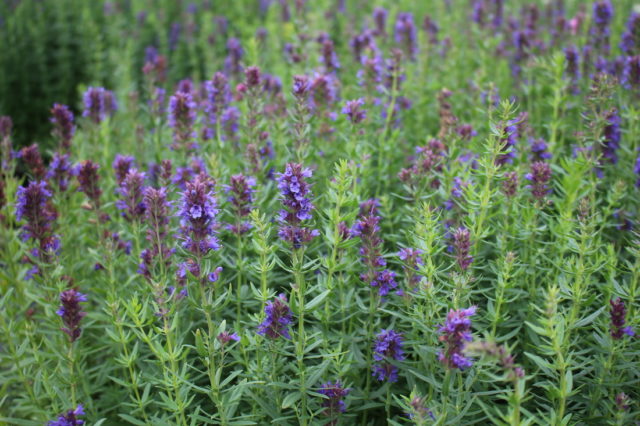
The chemical composition of the herb hyssop
The plant has a rich chemical composition that determines valuable properties:
- yellowish-green essential oil with a distinct camphor aroma contains alcohols, hydrocarbons, aldehydes, camphene, pinene, pinecampheol, while in plants with blue buds there is much more oil, has antimicrobial effect, and successfully fights viruses;
- flavonoids - diosmin, hesperidin, which have a beneficial effect on the secretion of the internal glands and the general condition of the body;
- tannins and bitter substances, resins induce appetite, have a choleretic effect, relieve inflammatory processes in the digestive tract;
- glycosides have a beneficial effect on the work of the heart and nervous system;
- acids - oleanolic and ursolic, normalize metabolic processes and strengthen cell membranes;
- The high content of vitamin C - 0.2% allows the herb to be used as a prophylactic agent for vitamin deficiency, in winter, during the period of massive viral epidemics.
The benefits of hyssop for the human body
The herb retains its unique properties both fresh and dried. Consumption in moderation helps prevent and treat a number of diseases. The plant has the following beneficial properties:
- When fresh grass leaves are used, a pronounced disinfecting effect is observed.
- The herb has a beneficial effect on the walls of blood vessels, strengthening them, normalizing blood composition and reducing the risk of blood clots.
- The plant stimulates the regenerative properties of the body, improves immunity.
- It has an excellent expectorant and bronchodilator effect.
- The plant normalizes the functioning of the gastrointestinal tract and heart, treats disorders of the nervous system.
- Relieves spasms, removes excess fluid from the body, cleanses the kidneys and ureters.
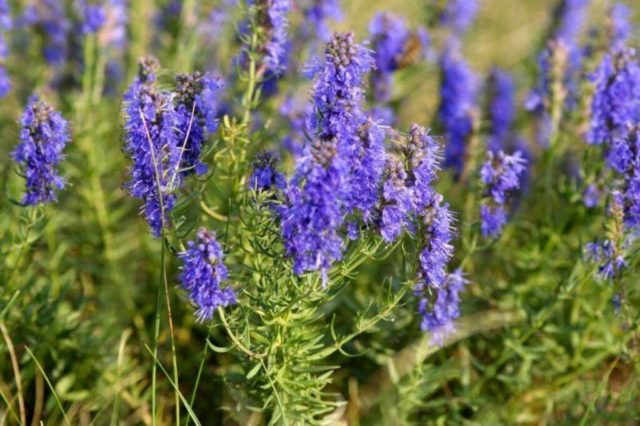
Hyssop harm
With uncontrolled and excessive use, the plant can harm the body. The main symptoms of an overdose:
- muscle spasms, colic;
- diarrhea and stomach upset;
- exacerbation of gastritis with high acidity;
- malfunctioning of the heart, lowering blood pressure to critical;
- nausea and vomiting, heartburn;
- convulsions and dizziness;
- allergic rash, urticaria, edema with individual intolerance.
Contraindications to hyssop
Like any other herbal remedy, hyssop has limitations:
- pregnancy and lactation;
- children under 12 years of age;
- tendency to epilepsy;
- high blood pressure;
- stomach diseases and duodenal ulcer.
Application of the herb hyssop
Modern medicine, like ancient folk recipes, recognizes the excellent healing properties of the hyssop herb. It is recommended for patients with weakened immunity, chronic fatigue syndrome and depression. The plant is excellent for stimulating memory, treating nervous disorders, and reduces the risk of Alzheimer's disease.
The herb restores the body after a long illness or surgery, profuse blood loss, accompanied by anemia. For women, hyssop is indicated for menopause: it effectively relieves the most unpleasant symptoms of the transition period.
With such disorders of the gastrointestinal tract as flatulence, dysbiosis or colitis, the herb gently eliminates the source of the problem and restores function. The plant is prescribed for the prevention of urolithiasis and as a remedy for rheumatism, arthritis, gout.
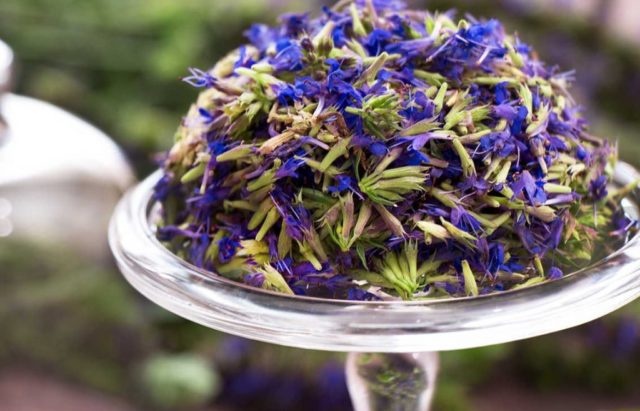
The use of hyssop officinalis in traditional medicine
Treatment of patients with herbal preparations has taken a new level since the study of their chemical composition became possible. Doctors prescribe hyssop herb, based on accurate scientific evidence, as a medicinal, restorative and preventive agent:
- With bronchitis, pneumonia, any inflammatory processes of the respiratory tract and tuberculosis, the medicinal properties of hyssop have an expectorant, anti-inflammatory and antimicrobial effect.
- In Austria, hyssop is widely used for asthma in the form of an alcohol solution that relieves symptoms, relieves spasm, leading to suffocation, and reduces the risk of a second attack.
- With the help of herbal preparations, they successfully treat colds and viral diseases, using as an antipyretic, decongestant and immunomodulating agent.
- In case of inflammation in the oral cavity - sore throat, stomatitis, fluxes, dental problems, rinsing with a decoction of the herb is recommended.
- With a napkin dipped in a decoction of the plant, wounds and bruises, inflamed skin lesions can be treated.
Hyssop should be used with caution for the treatment of children, since the plant contains substances that can disrupt the work of the heart muscle. If the pediatrician confirms the need to take a syrup or decoction of the plant for coughing, then the recommended dosages should be followed exactly.
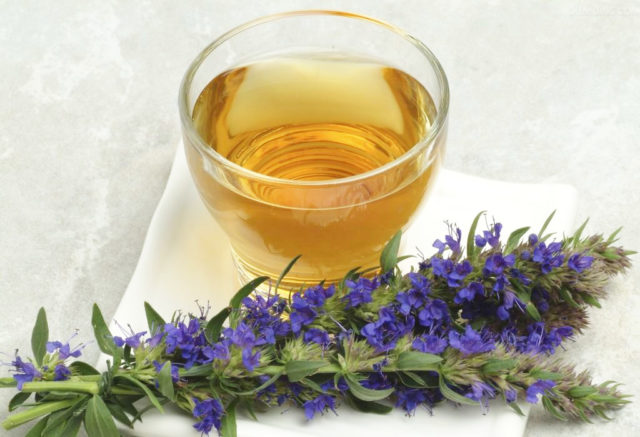
The use of hyssop in traditional medicine
For a long time, people have noticed the beneficial effects of herbs on the human body. Since then, folk recipes have been expanded and replenished, giving the possibility of healing. So, the medicinal properties of hyssop make it possible to use it for coughs of various etiologies, skin problems, from suppurations and bruises to fungal infections.
The most effective recipes of traditional healers:
- Skin diseases... Compresses are needed: 20 g of hyssop herb, 40 g of chamomile flowers, 40 g of field horsetail, brewed with 1.5 cups of boiling water. Infuse the broth for two hours, drain.
- Tuberculosis... Tincture of 150 g of hyssop herb and 1.5 liters of vodka, infused in a dark place for a week. Take 10 ml before meals for a month.
- Burn ointment... Cook 200 ml of vegetable oil and 130 g of chopped fresh hyssop in a water bath for eight hours. Strain and refrigerate.
- Cold... It is necessary to prepare a decoction of the following components - 20 g of hyssop herb, 20 g of anise seeds, 20 g of fennel seeds, 60 g of raisins, 60 g of figs and 1 liter of water. Boil the boiled mixture over low heat for half an hour, strain, cool, mix with 100 ml of honey. Take 10 ml 4-5 times a day. A simple infusion of 200 ml of boiling water and 40 g of the plant also works great. Pour hyssop with water, leave for 20 minutes and drink warm.
Herbal infusions work well for bronchial asthma, bronchitis, dry senile cough, tracheitis, shortness of breath. Since ancient times, plant oil has been used as an effective cosmetic product that softens and visibly revitalizes the skin. Used for rubbing with colds, soothing baths.
The use of the herb hyssop in cooking
For culinary use, the plant must be harvested and dried in a shaded, ventilated place. You can tie the stems with a "broom" or cut the leaves, branch tops and flowers to obtain a homogeneous dry mass. The herb derived from the hyssop herb has universal properties and is therefore very popular among amateurs and professionals.
The plant is used in the following culinary fields:
- For the preparation of various meat dishes: minced meat, pâté, chops, cutlets, stews, tenderloins.
- Meat stewed with hyssop not only acquires excellent taste and aroma, but is also better absorbed by the body.
- Hyssop perfectly complements cucumber and tomato salads, omelets and stuffed eggs, baked vegetables.
- A regular bean soup with this spice turns into a gourmet paradise.
- An excellent combination of dried plant leaves and unsweetened cottage cheese dishes, a sandwich mass of cheese, nuts and salt.
- You can add hyssop to pies, whites, dumplings and manti, make a sauce for pasta with it.
Hyssop is part of such a popular spice mix as suneli hops. On its own, it can be combined with basil and mint, parsley and dill, fennel, celery.
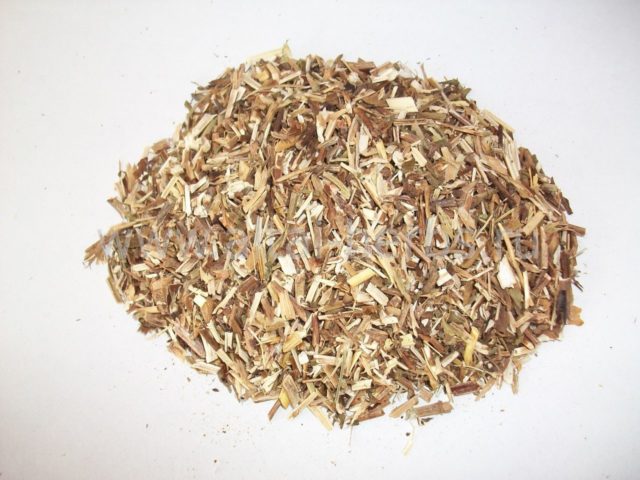
The use of the hyssop plant in cosmetology
In the cosmetics industry, essential oil and hyssop hydrolate are used. Thanks to its excellent properties, the plant stimulates the regeneration of cells in the outer layers of the body. It has anti-inflammatory, moisturizing and soothing effects on all skin types. The herb is especially effective on fading, problematic, dry and dehydrated dermis. Hyssop is used to absorb scars and stretch marks. An excellent effect is provided by oil for hand skin care, as well as with increased sweating.
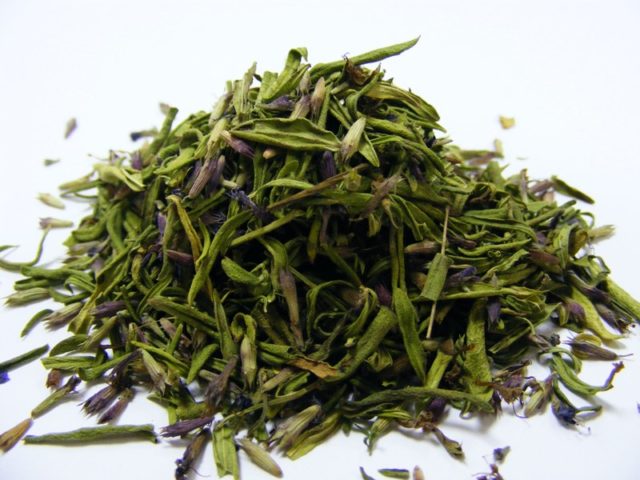
Hyssop during pregnancy
Hyssop helps to conceive a child safely. But during the period of gestation, its use should be stopped. Hyssop herb increases tone, which can lead to miscarriage or premature birth. In addition, it significantly increases blood pressure, which can negatively affect the development of the fetus.
You can use the plant and its oils externally - in the form of lotions, compresses, rubbing into problem areas. It removes bags under the eyes, swelling on the legs and face well. Improves skin and hair condition.
Conclusion
The medicinal properties and contraindications of the herb hyssop were known to our ancestors. Since then, pharmacology has advanced far ahead, but the use of hyssop for some diseases is still recommended by specialists. It gives excellent results in the treatment of colds and coughs, inflammation of the oral cavity and pharynx.The plant perfectly restores a weakened body, improves the functioning of the nervous system, it can be brewed with tea as a general tonic. In addition, hyssop is a great spice that gives the dish a pungent spice.

